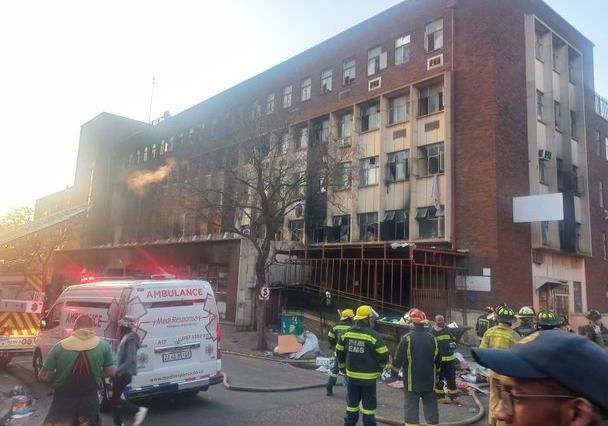Johannesburg – Search dogs looked for bodies on Friday in a Johannesburg building that went up in flames killing dozens and forcing South Africa to confront an illegal housing “crisis”.
At least 74 people including 12 children died as fire ripped through the five-storey building in the early hours on Thursday.
Authorities asked relatives to go to a morgue in Soweto to identify the victims, as the search continued at the site.
The fire has reopened a debate about so-called hijacked buildings — old disused blocks that have fallen under the control of criminal syndicates who collect rent from squatters.
President Cyril Ramaphosa said it was “a wake-up call for us to begin to address the situation of housing in the inner cities” as he visited the site late on Thursday.
The building, located in an economically depressed, crime-ridden area, was owned by the municipality and listed as a heritage site.
Government across all levels is working around the clock to ensure that those who need assistance, from alternative accommodation to trauma counselling, are being looked after. #JHBFire pic.twitter.com/aEEJRjRxCi
— Cyril Ramaphosa 🇿🇦 (@CyrilRamaphosa) August 31, 2023
During the apartheid era, black South Africans would go there for papers allowing them to access white areas for work.
City authorities said it was last used as a shelter for abused women but was “invaded and hijacked” towards the end of the past decade.
Police raided the building in 2019, arresting 140 foreign nationals.
But in a country struggling with massive crime rates, little changed.
Johannesburg city manager Floyd Brink told reporters on Thursday that police had opened a case following the raid but “no update” was immediately available.
About 200 families were thought to be living at the premises at the time of the fire, he said.
Authorities estimated that more than “80 shacks” were set up inside.
‘Catastrophe waiting to happen’
The case is not isolated.
Illegal occupation of abandoned buildings in downtown Johannesburg, which slumped into decay and decline in the 1990s, is widespread.
After years of sanctions during the 1980s, the advent of democracy in 1994 saw many white-owned businesses move out to security-fenced suburbs.
Entire blocks were left empty. Hotels simply bricked over their doors without even bothering to auction off the contents.
“Many of these abandoned buildings are controlled by gangs who rent out the space,” said Mervyn Cirota, a provincial councillor in Johannesburg’s Gauteng province from the opposition Democratic Alliance party.
“This leads to overcrowding, there are no toilets, no electricity and no water,” he said, describing the fire as a “catastrophe waiting to happen”.
“Measures need to be put in place urgently to ensure that we do not have another disaster like this one.”
‘Urgent solutions’
More than 60 people were injured in what was one of the deadliest fires worldwide in recent years.
Bodies were discovered piled up at a security gate that was closed, preventing people from escaping the blaze, an official said.
Residents told AFP each of the five floors had a gate that was kept locked at night to keep out police and possible intruders.
It was not immediately clear what caused the blaze.
House fires are relatively common in South Africa, plagued by chronic power outages, where poverty and homelessness are widespread.
Authorities said candles used for lighting inside the structure or stoves and other heating devices were a likely cause.
“All metropolitan municipalities must urgently find solutions to the hijacked building crisis in major cities,” said lawmaker China Dodovu, chairman of a parliamentary committee on human settlements.
South Africa, with the continent’s most industrialised economy, attracts millions of migrants, many undocumented, from other African nations.
Most of those living at the building were foreigners, one resident said.
Follow African Insider on Facebook, Twitter and Instagram
Source: AFP
Picture: Twitter/@CandleySeroba
For more African news, visit Africaninsider.com


